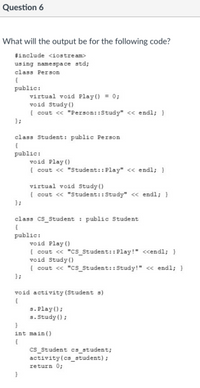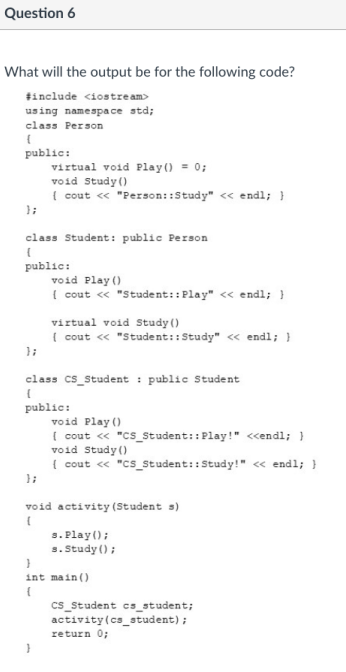
Database System Concepts
7th Edition
ISBN: 9780078022159
Author: Abraham Silberschatz Professor, Henry F. Korth, S. Sudarshan
Publisher: McGraw-Hill Education
expand_more
expand_more
format_list_bulleted
Concept explainers
Question

Transcribed Image Text:Question 6
What will the output be for the following code?
tinclude <iostre am>
using namespa ce std;
class Person
public:
virtual void Play() = 0;
void Study ()
{ cout « "Person::Study" << endl; }
class Student: public Person
public:
void Play ()
{ cout « "Student::Play" << endl; }
virtual void Study ()
( cout « "Student::Study" <« endl; }
class cs_Student : public Student
public:
void Play ()
( cout <« "Cs_Student:: Play!" <<endl; }
void Study ()
{ cout « "cs_Student:: Study!" « endl; }
void activity (Student s)
s. Play();
s. Study ();
int main ()
cs_student cs_student;
activity(cs_student);
return 0;

Transcribed Image Text:Question 7
Based on the output of the previous problem, what problems do you see, if any? If you see problems, how would you fix it?
Expert Solution
arrow_forward
Step 1
Given:


Step by stepSolved in 2 steps with 4 images

Knowledge Booster
Learn more about
Need a deep-dive on the concept behind this application? Look no further. Learn more about this topic, computer-science and related others by exploring similar questions and additional content below.Similar questions
- In C++ Q1.) Write a Review class that has: • These private data members: • string user: ID of the user • string item: ID of the item • double paid: the price of the item that the user buys • double rating: the rating that the user gives to the item • string review: the review content that the user gives to the item • These public member functions: • A default constructor to set all instance variables to a default value • A parameterized constructor (i.e., a constructor with arguments) to set all instance variables • A method for getting/setting the instance variables. • A method for printing the Review's information.arrow_forwardProgram SpecificationUsing python, design a class named PersonData with the following member variables: lastName firstName address city state zip phone Write the appropriate accessor and mutator functions for these member variables. Next, design a class named CustomerData , which is derived from the PersonData class. The CustomerData class should have the following member variables: customerNumber mailingList The customerNumber variable will be used to hold a unique integer for each customer. The mailingList variable should be a bool . It will be set to true if the customer wishes to be on a mailing list, or false if the customer does not wish to be on a mail-ing list. Write appropriate accessor and mutator functions for these member variables. Next write a program which demonstrates an object of the CustomerData class in a program. Your program MUST use exception handling. You can choose how to implement the exception handling. Start your program with a welcome message Make sure…arrow_forwardIn C++arrow_forward
- There are two types of data members in a class: static and non-static. Provide an example of when it might be useful to have a static data member in the actual world.arrow_forwarddo part 4 import java.util.*; // Car classclass Car{ private String name; // Variable to hold car name private String model; // Variable to hold car model // Default constructor Car(){ this.name = null; this.model = null; } // Parametrised constructor Car(String name, String model){ this.name = name; this.model = model; } // Function to get car name public String getName(){ return this.name; }} // Dealer classclass Dealer{ private Car[] arr; // Array holding car objects for a dealer private int count; // Variable to hold number of cars under a dealer // Default constructor Dealer(){ arr = new Car[50]; count=0; } // Function to add a car under a dealer public void addCar(Car obj){ this.arr[this.count] = obj; this.count++; } // Function to check if a car exists under a dealer or not public boolean contains(String name){…arrow_forwardC++ #include <iostream>using namespace std; //creating struct to hold //student name,age and letter gradestruct student{ //data members string name; int age; char grade;};int main(){ //declaring object for the struct student *k = new student; //filling it with data k->name = "Kate"; k->age=24; k->grade='B'; ///then printing student data cout<<"Name:"<<k->name<<endl; cout<<"Age:"<<k->age<<endl; cout<<"Grade:"<<k->grade<<endl; return 0;}arrow_forward
- C:/Users/r1821655/CLionProjects/untitled/sequence.cpp:48:5: error: return type specification for constructor invalidtemplate <class Item>class sequence{public:// TYPEDEFS and MEMBER SP2020typedef Item value_type;typedef std::size_t size_type;static const size_type CAPACITY = 10;// CONSTRUCTORsequence();// MODIFICATION MEMBER FUNCTIONSvoid start();void end();void advance();void move_back();void add(const value_type& entry);void remove_current();// CONSTANT MEMBER FUNCTIONSsize_type size() const;bool is_item() const;value_type current() const;private:value_type data[CAPACITY];size_type used;size_type current_index;};} 48 | void sequence<Item>::sequence() : used(0), current_index(0) { } | ^~~~ line 47 template<class Item> line 48 void sequence<Item>::sequence() : used(0), current_index(0) { }arrow_forwardC++ coding project just need some help getting the code thank you!arrow_forwardQuestion is in the image #include <iostream> using namespace std; class Game { public: Game() { cout <<"Game Started"<<endl; } //destructor goes here }; class Quiz: public Game { public: Quiz() { cout <<"Quiz Started"<<endl; } //destructor goes here }; int main() { Quiz q; }arrow_forward
arrow_back_ios
arrow_forward_ios
Recommended textbooks for you
 Database System ConceptsComputer ScienceISBN:9780078022159Author:Abraham Silberschatz Professor, Henry F. Korth, S. SudarshanPublisher:McGraw-Hill Education
Database System ConceptsComputer ScienceISBN:9780078022159Author:Abraham Silberschatz Professor, Henry F. Korth, S. SudarshanPublisher:McGraw-Hill Education Starting Out with Python (4th Edition)Computer ScienceISBN:9780134444321Author:Tony GaddisPublisher:PEARSON
Starting Out with Python (4th Edition)Computer ScienceISBN:9780134444321Author:Tony GaddisPublisher:PEARSON Digital Fundamentals (11th Edition)Computer ScienceISBN:9780132737968Author:Thomas L. FloydPublisher:PEARSON
Digital Fundamentals (11th Edition)Computer ScienceISBN:9780132737968Author:Thomas L. FloydPublisher:PEARSON C How to Program (8th Edition)Computer ScienceISBN:9780133976892Author:Paul J. Deitel, Harvey DeitelPublisher:PEARSON
C How to Program (8th Edition)Computer ScienceISBN:9780133976892Author:Paul J. Deitel, Harvey DeitelPublisher:PEARSON Database Systems: Design, Implementation, & Manag...Computer ScienceISBN:9781337627900Author:Carlos Coronel, Steven MorrisPublisher:Cengage Learning
Database Systems: Design, Implementation, & Manag...Computer ScienceISBN:9781337627900Author:Carlos Coronel, Steven MorrisPublisher:Cengage Learning Programmable Logic ControllersComputer ScienceISBN:9780073373843Author:Frank D. PetruzellaPublisher:McGraw-Hill Education
Programmable Logic ControllersComputer ScienceISBN:9780073373843Author:Frank D. PetruzellaPublisher:McGraw-Hill Education

Database System Concepts
Computer Science
ISBN:9780078022159
Author:Abraham Silberschatz Professor, Henry F. Korth, S. Sudarshan
Publisher:McGraw-Hill Education

Starting Out with Python (4th Edition)
Computer Science
ISBN:9780134444321
Author:Tony Gaddis
Publisher:PEARSON

Digital Fundamentals (11th Edition)
Computer Science
ISBN:9780132737968
Author:Thomas L. Floyd
Publisher:PEARSON

C How to Program (8th Edition)
Computer Science
ISBN:9780133976892
Author:Paul J. Deitel, Harvey Deitel
Publisher:PEARSON

Database Systems: Design, Implementation, & Manag...
Computer Science
ISBN:9781337627900
Author:Carlos Coronel, Steven Morris
Publisher:Cengage Learning

Programmable Logic Controllers
Computer Science
ISBN:9780073373843
Author:Frank D. Petruzella
Publisher:McGraw-Hill Education